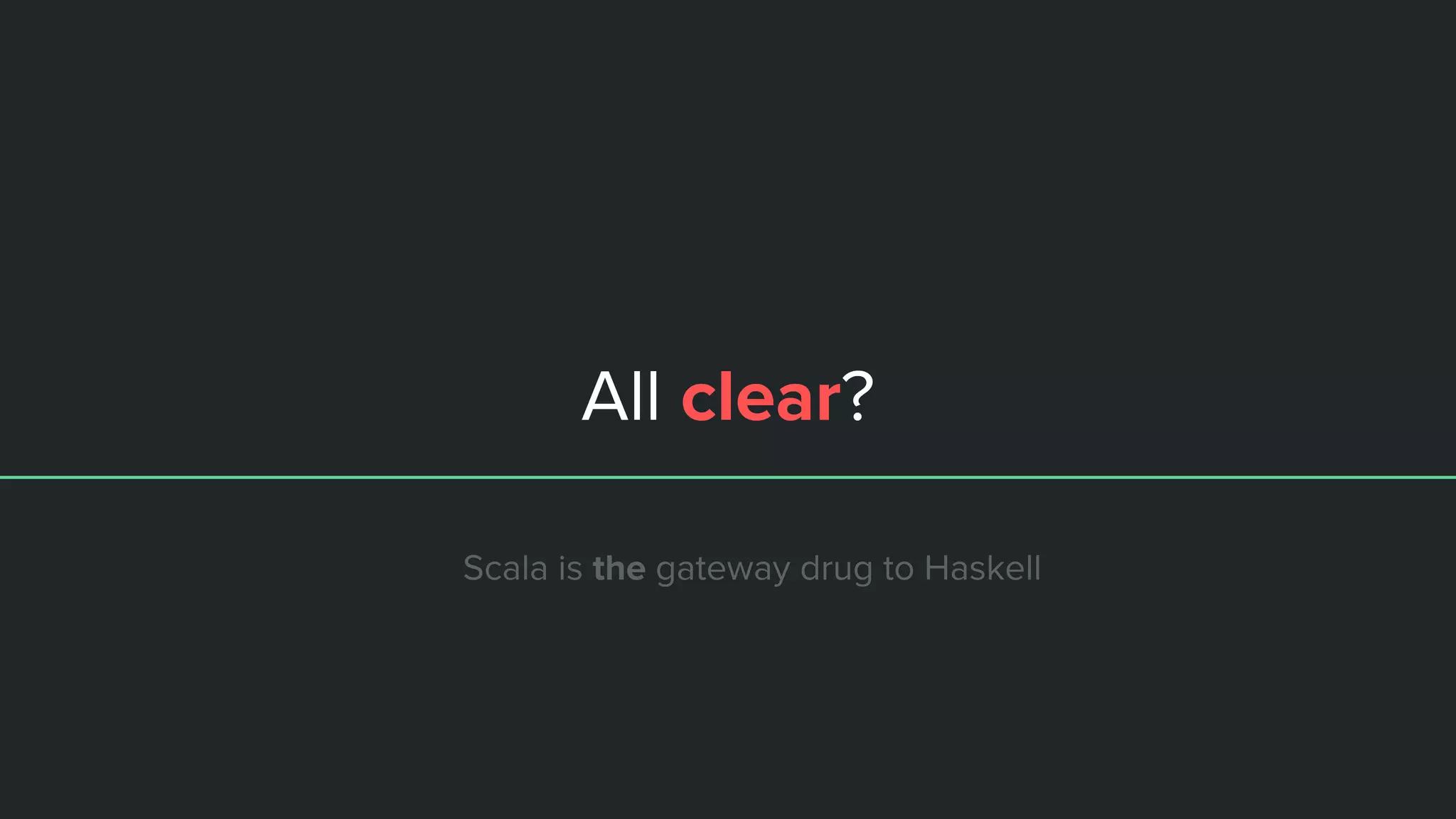The document discusses generic functional programming using Scala, emphasizing type classes, ad-hoc polymorphism, and referential transparency. It covers various concepts such as pure functions, data handling with decoders, and the design of generic data structures and interpreter patterns. The presentation highlights Scala's capabilities in creating efficient, functional programming constructs while introducing foundational ideas relevant to Haskell.
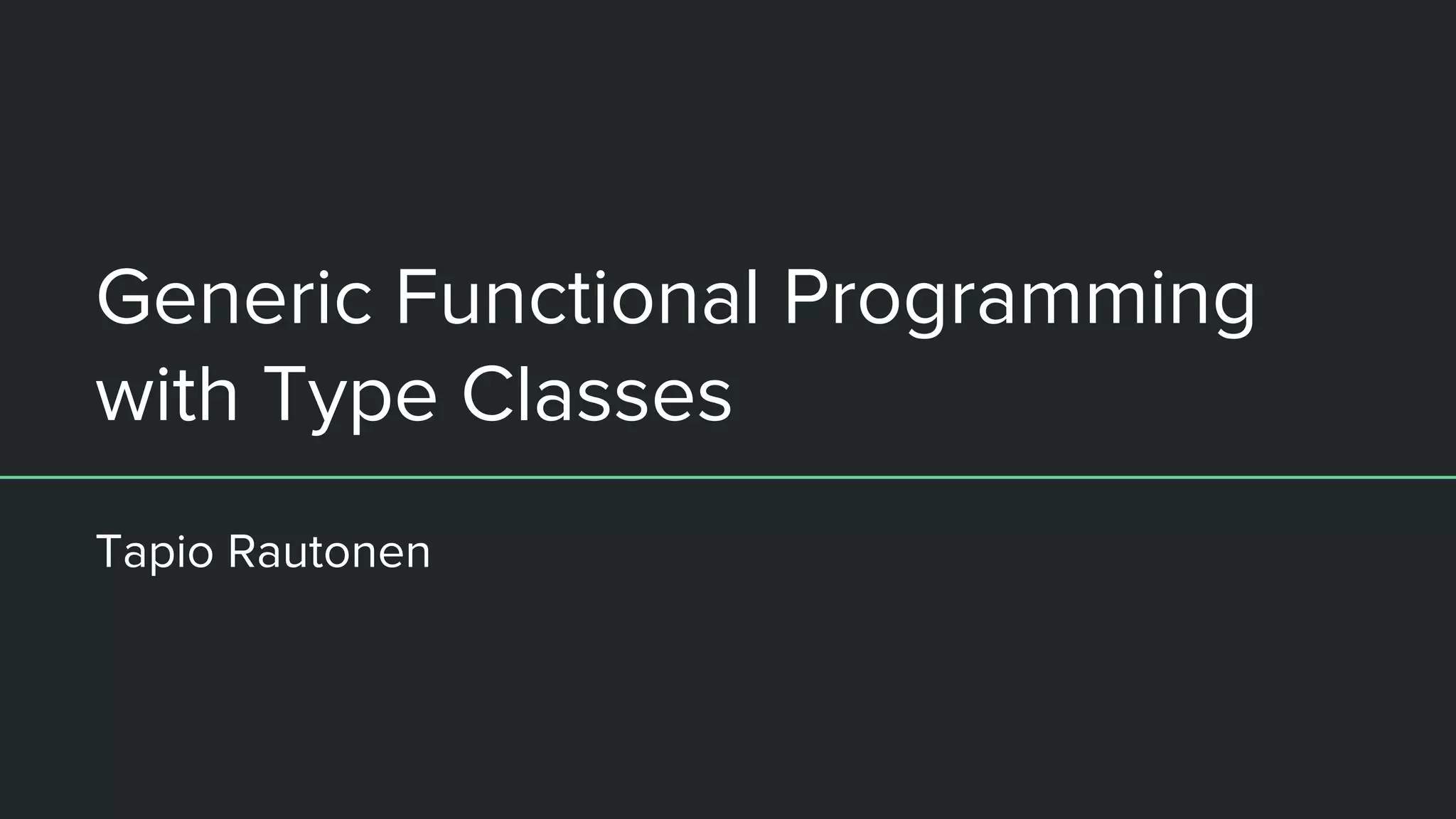
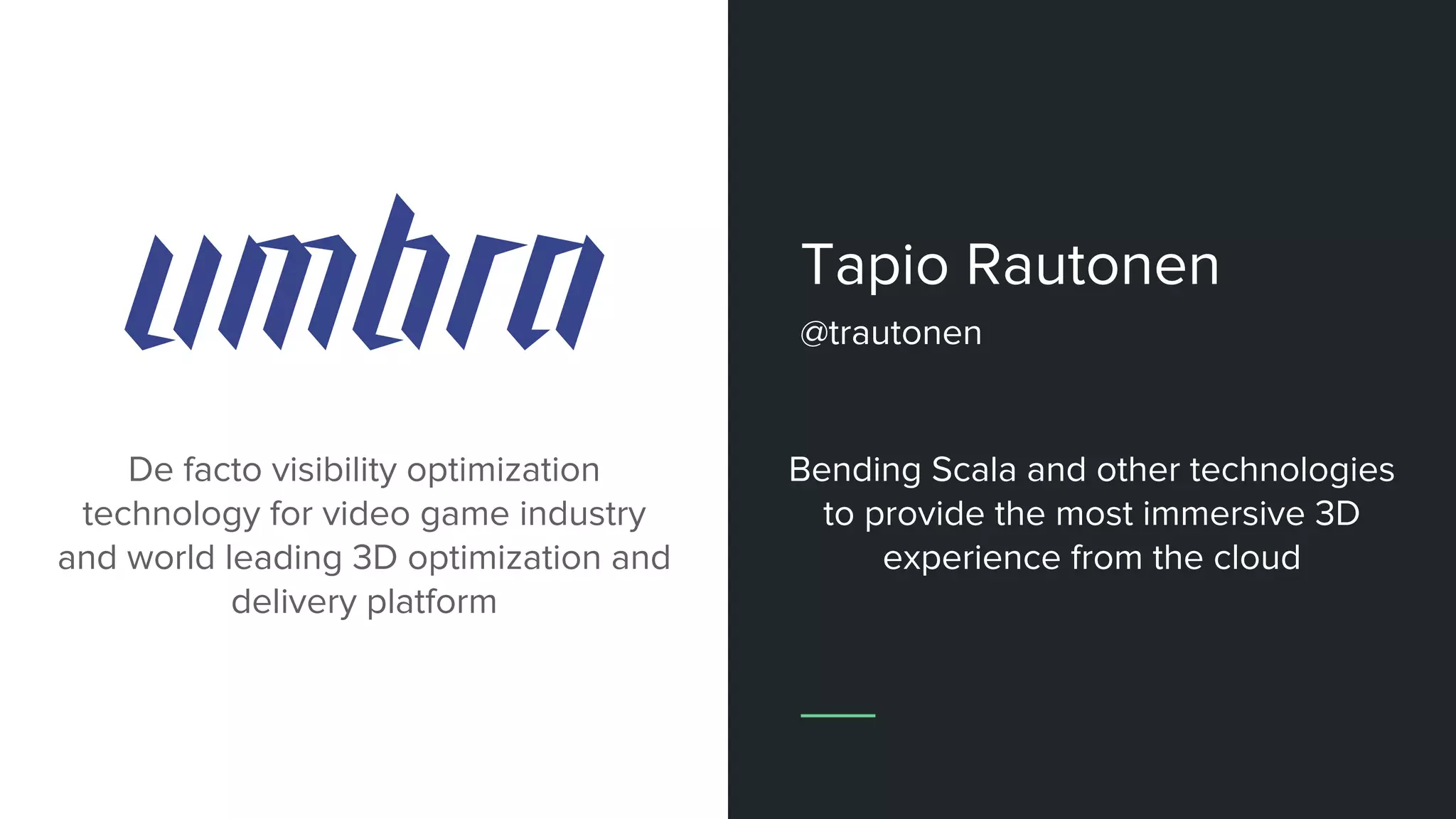
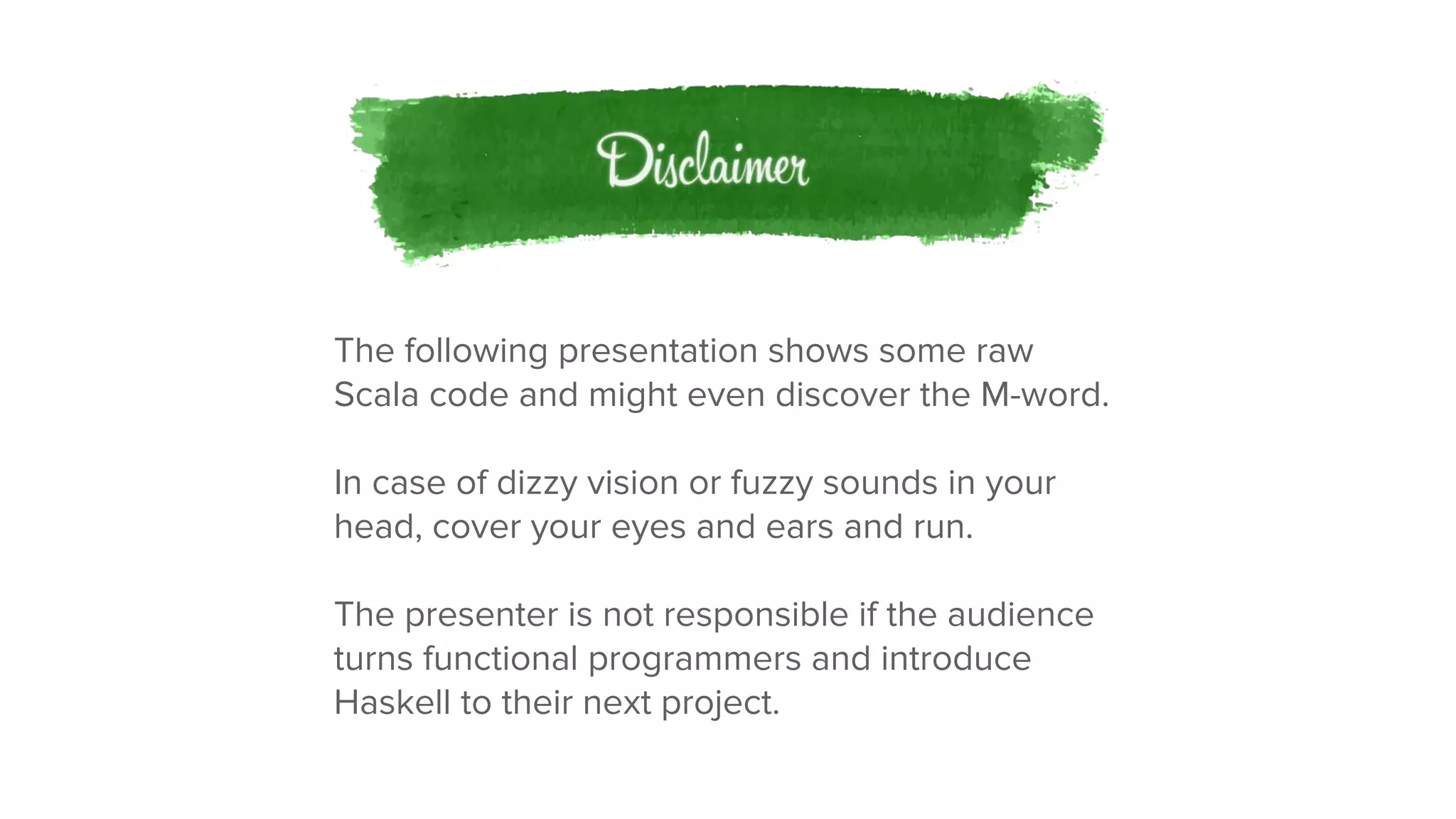
![Generic is not specific
trait ContactRepository {
def getContact(name: String): Future[Option[Contact]]
def updateContact(contact: Contact): Future[Contact]
}
trait Calculus {
def sum(x: Double, y: Double): Either[ArithmeticError, Double]
def divide(x: Double, y: Double): Either[ArithmeticError, Double]
def mean(xs: Iterable[Double]): Either[ArithmeticError, Double]
}](https://image.slidesharecdn.com/genericfunctionalprogrammingwithtypeclasses-190326075104/75/Generic-Functional-Programming-with-Type-Classes-4-2048.jpg)

![Type classes are not ad hoc inheritance
abstract class Animal {
var name: String = null
def utter(): Unit
override def equals(obj: Any): Boolean =
obj.isInstanceOf[Animal] && obj.asInstanceOf[Animal].name == name
}
class Dog extends Animal {
override def utter(): Unit = print("Wuf!")
override def equals(obj: Any): Boolean =
obj.isInstanceOf[Dog] && super.equals(obj)
}](https://image.slidesharecdn.com/genericfunctionalprogrammingwithtypeclasses-190326075104/75/Generic-Functional-Programming-with-Type-Classes-6-2048.jpg)
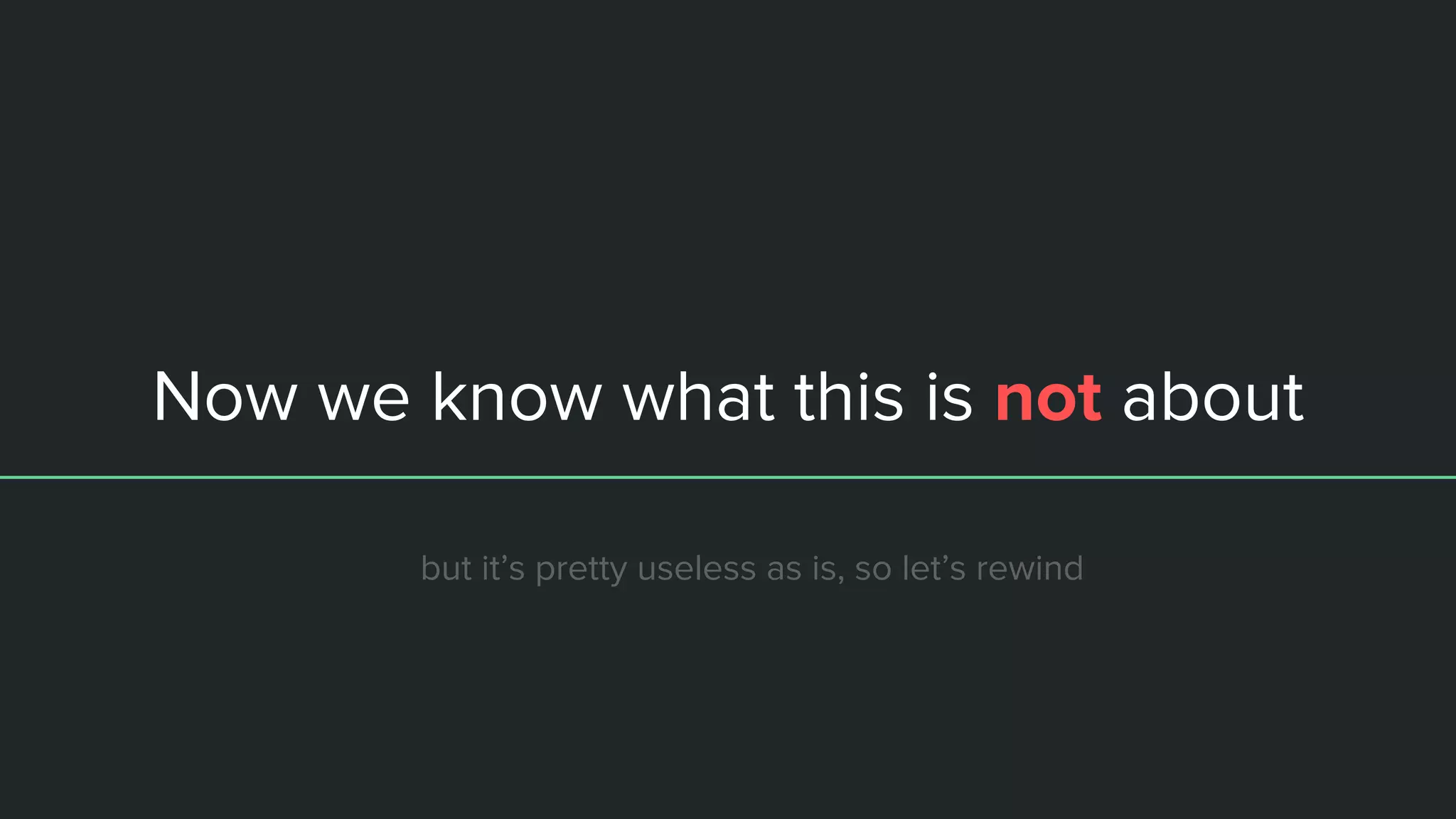
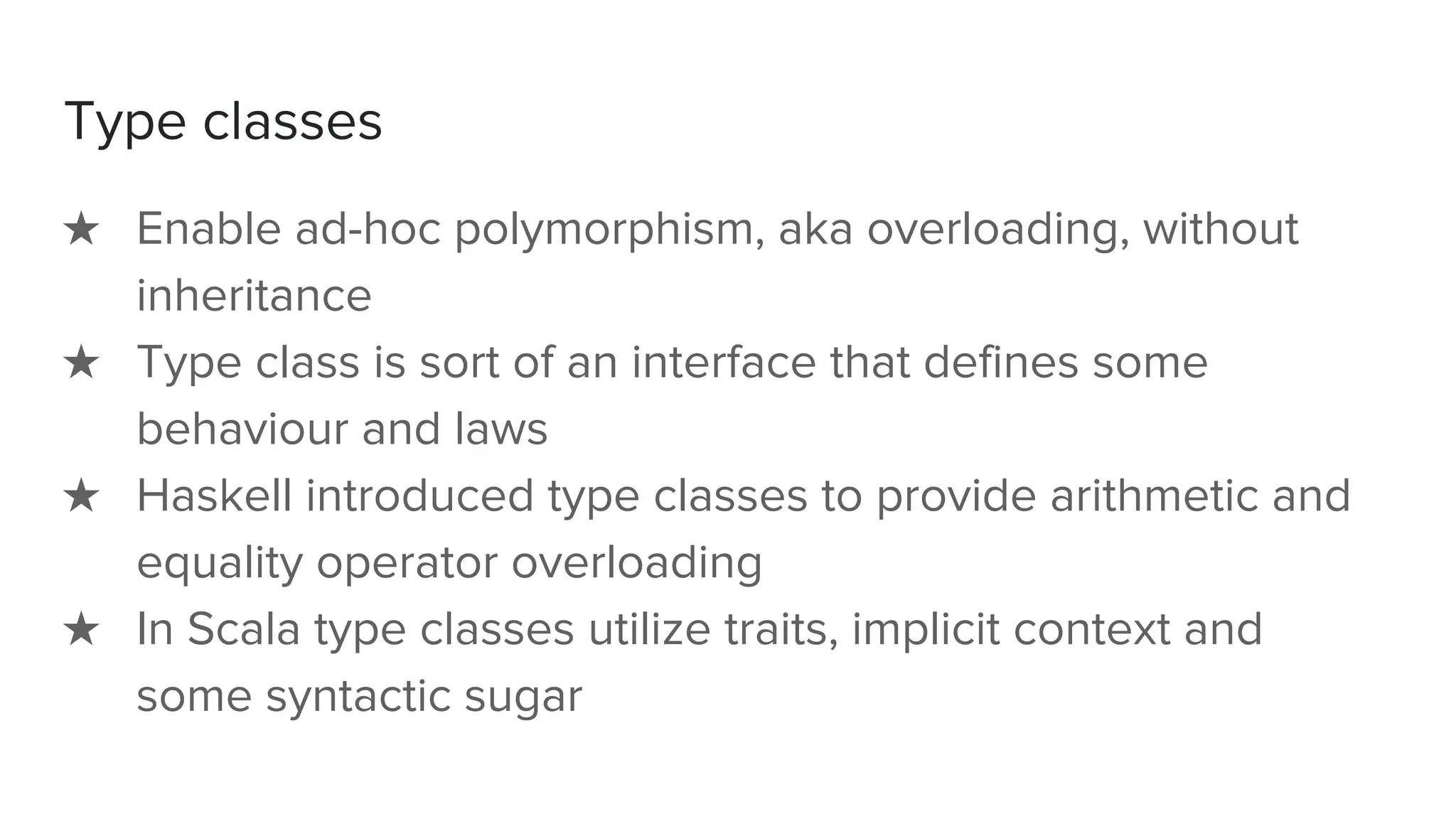
![Type classes - equality interface
trait Equality[T] {
def equals(a: T, b: T): Boolean
}
object Equality {
def equivalent[T](a: T, b: T)(implicit ev: Equality[T]): Boolean =
ev.equals(a, b)
def equivalent[T: Equality](a: T, b: T): Boolean =
implicitly[Equality[T]].equals(a, b)
}](https://image.slidesharecdn.com/genericfunctionalprogrammingwithtypeclasses-190326075104/75/Generic-Functional-Programming-with-Type-Classes-9-2048.jpg)
![Type classes - equality implementation
implicit val doubleEquality = new Equality[Double] {
override def equals(a: Double, b: Double): Boolean =
a == b
}
implicit val durationEquality = new Equality[Duration] {
override def equals(a: Duration, b: Duration): Boolean =
a.toNanos == b.toNanos
}
equivalent(1.3, 1.2)
//res0: false
equivalent(60.seconds, 1.minute)
//res1: true](https://image.slidesharecdn.com/genericfunctionalprogrammingwithtypeclasses-190326075104/75/Generic-Functional-Programming-with-Type-Classes-10-2048.jpg)
![Type classes - deserialization
trait Decoder[T] {
def decode(value: String): Either[DecodingError, T]
}
object Decoders {
implicit val jsonDecoder = new Decoder[Json] {
override def decode(value: String): Either[DecodingError, Json] =
JsonParser.parse(value) }
implicit val xmlDecoder = new Decoder[Xml] {
override def decode(value: String): Either[DecodingError, Xml] =
XmlReader.readInput(new ByteInputStream(value.getBytes())) }
}](https://image.slidesharecdn.com/genericfunctionalprogrammingwithtypeclasses-190326075104/75/Generic-Functional-Programming-with-Type-Classes-11-2048.jpg)
![Type classes - request handler
class RequestHandler[D: Decoder] {
def handleRequest(request: Request): Response = {
implicitly[Decoder[D]].decode(request.body) match {
case Left(error) => Response(400, error.message)
case Right(body) => Response(200, body)
}
}
}
import Decoders.jsonDecoder
val jsonRequestHandler = new RequestHandler[Json]](https://image.slidesharecdn.com/genericfunctionalprogrammingwithtypeclasses-190326075104/75/Generic-Functional-Programming-with-Type-Classes-12-2048.jpg)
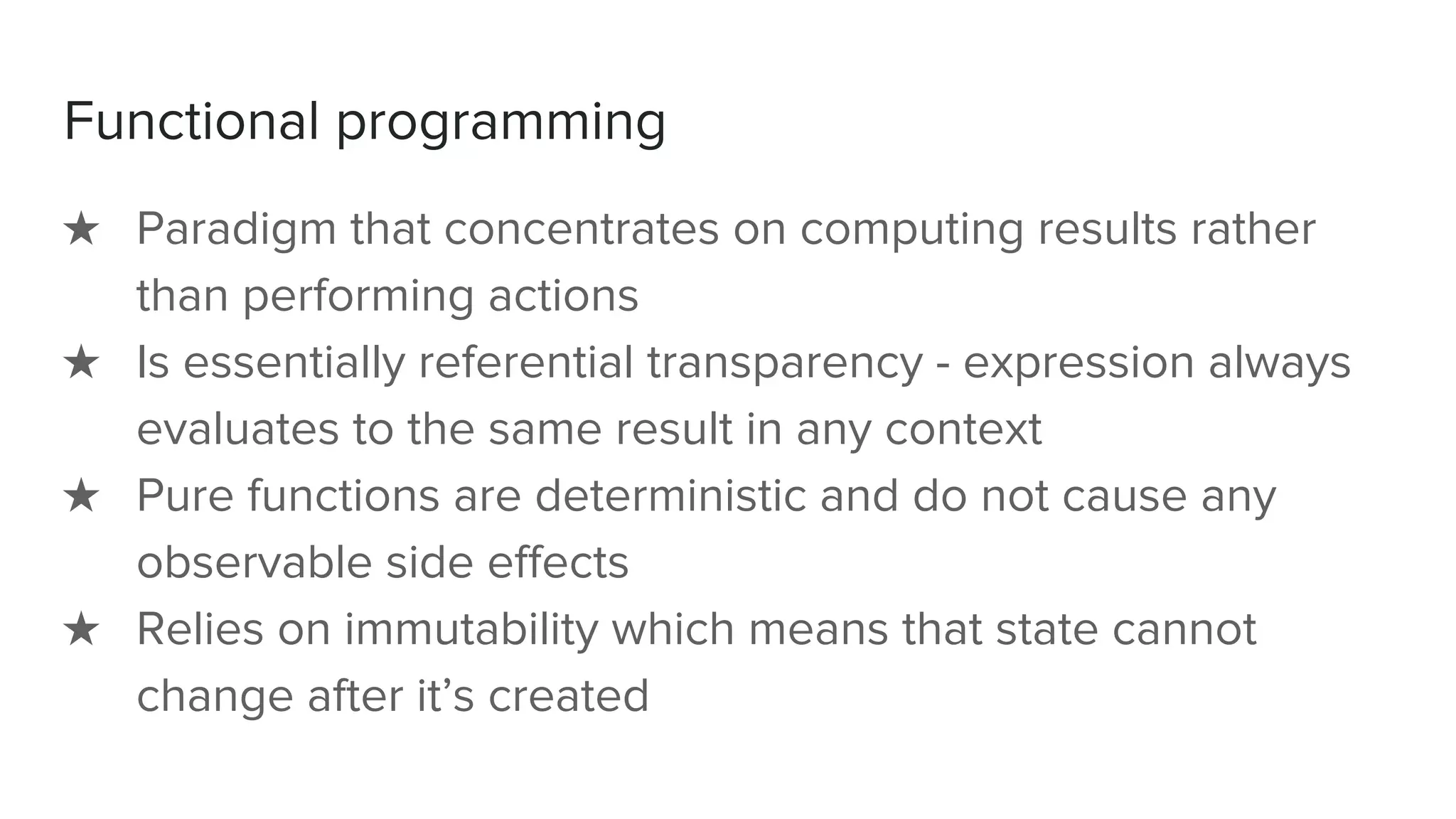
![Functional programming - pure functions
def add(a: Int, b: Int): Int = a + b
def sum(list: List[Int]): Int = list match {
case Nil => 0
case head :: tail => head + sum(tail)
}
List(1, 2, 3, 4, 5).map(n => n + 1)](https://image.slidesharecdn.com/genericfunctionalprogrammingwithtypeclasses-190326075104/75/Generic-Functional-Programming-with-Type-Classes-14-2048.jpg)
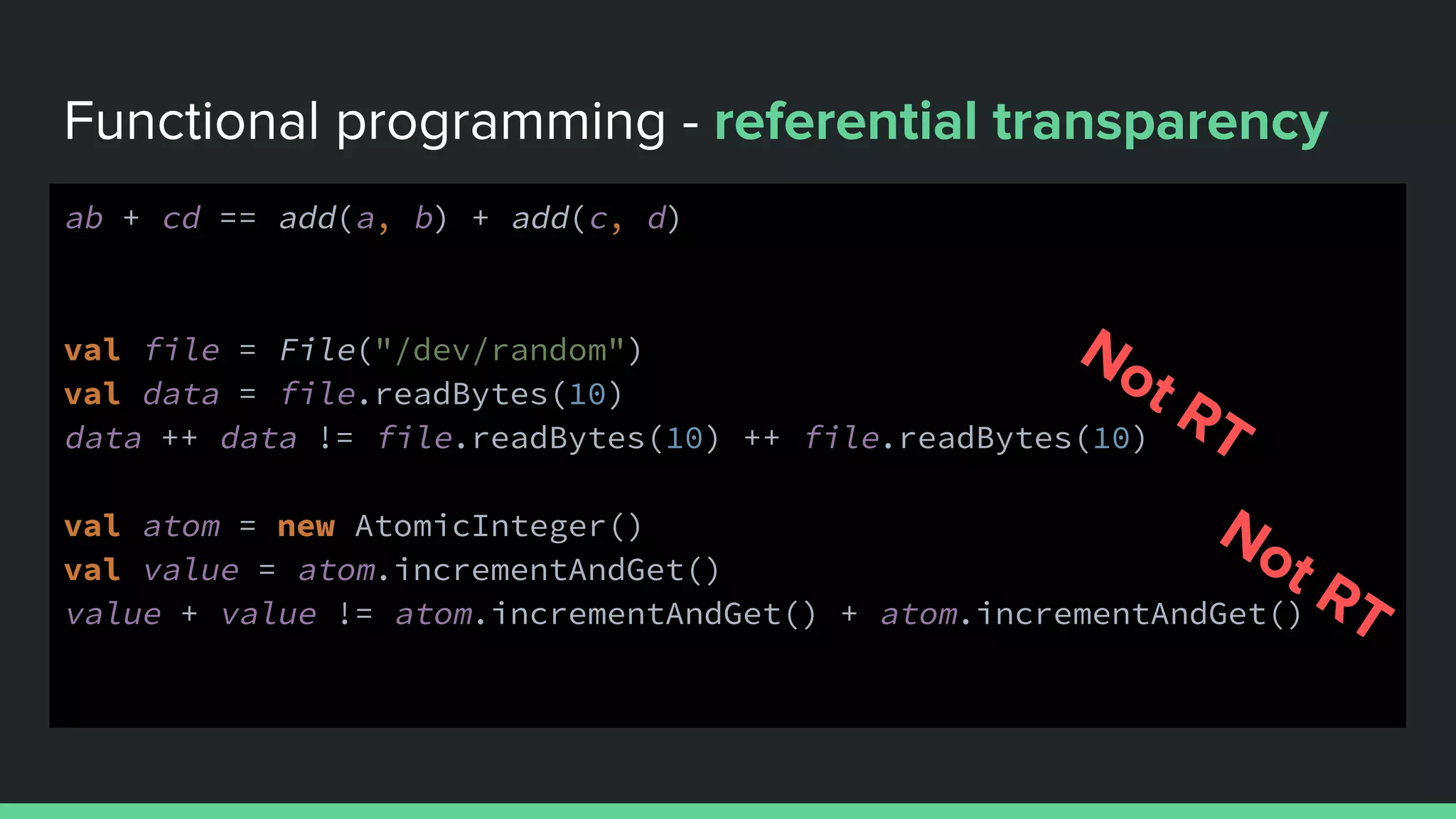

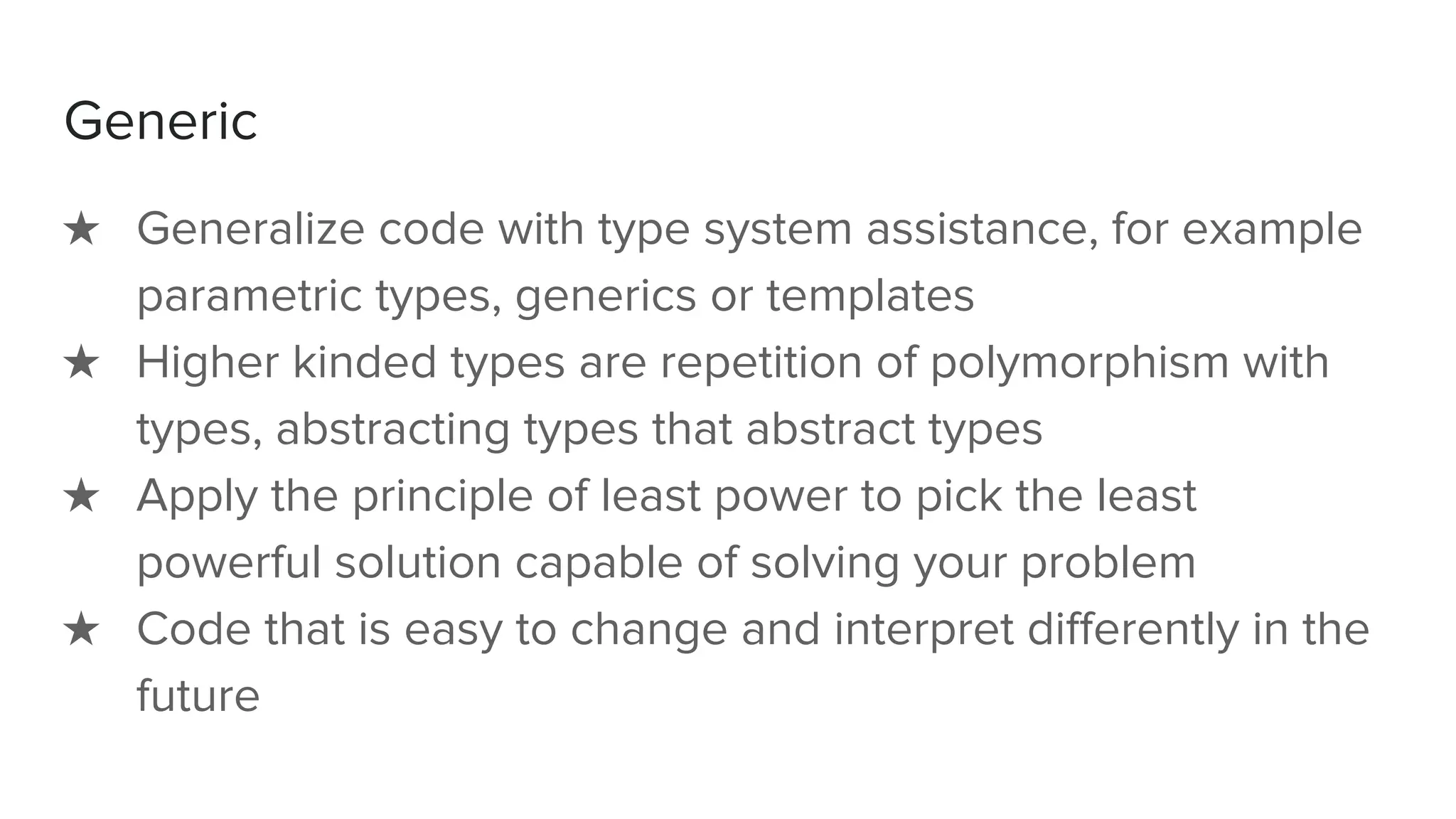
![Generic - first-order
trait List[T] {
def isEmpty: Boolean
def head: T
def tail: List[T]
}
trait Monoid[A] {
def combine(x: A, y: A): A
def empty: A
}](https://image.slidesharecdn.com/genericfunctionalprogrammingwithtypeclasses-190326075104/75/Generic-Functional-Programming-with-Type-Classes-18-2048.jpg)
![Generic - composition
implicit val integerAddition: Monoid[Int] = new Monoid[Int] {
override def combine(x: Int, y: Int): Int = x + y
override def empty: Int = 0
}
def combineAll[A: Monoid](values: List[A]): A =
values.foldLeft(implicitly[Monoid[A]].empty)
(implicitly[Monoid[A]].combine)](https://image.slidesharecdn.com/genericfunctionalprogrammingwithtypeclasses-190326075104/75/Generic-Functional-Programming-with-Type-Classes-19-2048.jpg)
![Generic - higher order
trait Monad[F[_]] {
def flatMap[A, B](fa: F[A])(f: A => F[B]): F[B]
def pure[A](x: A): F[A]
}
def map[A, B, F[_]: Monad](fa: F[A])(f: A => B): F[B] =
implicitly[Monad[F]].flatMap(fa)
(a => implicitly[Monad[F]].pure(f(a)))](https://image.slidesharecdn.com/genericfunctionalprogrammingwithtypeclasses-190326075104/75/Generic-Functional-Programming-with-Type-Classes-20-2048.jpg)
![Generic - higher order implementation
implicit val listMonad = new Monad[List] {
def flatMap[A, B](fa: List[A])(f: A => List[B]): List[B] = fa.flatMap(f)
def pure[A](x: A): List[A] = List(x)
}
implicit val streamMonad = new Monad[Stream] {
def flatMap[A, B](fa: Stream[A])(f: A => Stream[B]): Stream[B] =
fa.flatMap(f)
def pure[A](x: A): Stream[A] = Stream(x)
}
map(List(1, 2, 3, 4, 5))(_ + 1)
//res0: List(2, 3, 4, 5 ,6)
map(Stream(1, 2, 3, 4, 5))(_ + 1)
//res1: Stream(2, ?)](https://image.slidesharecdn.com/genericfunctionalprogrammingwithtypeclasses-190326075104/75/Generic-Functional-Programming-with-Type-Classes-21-2048.jpg)
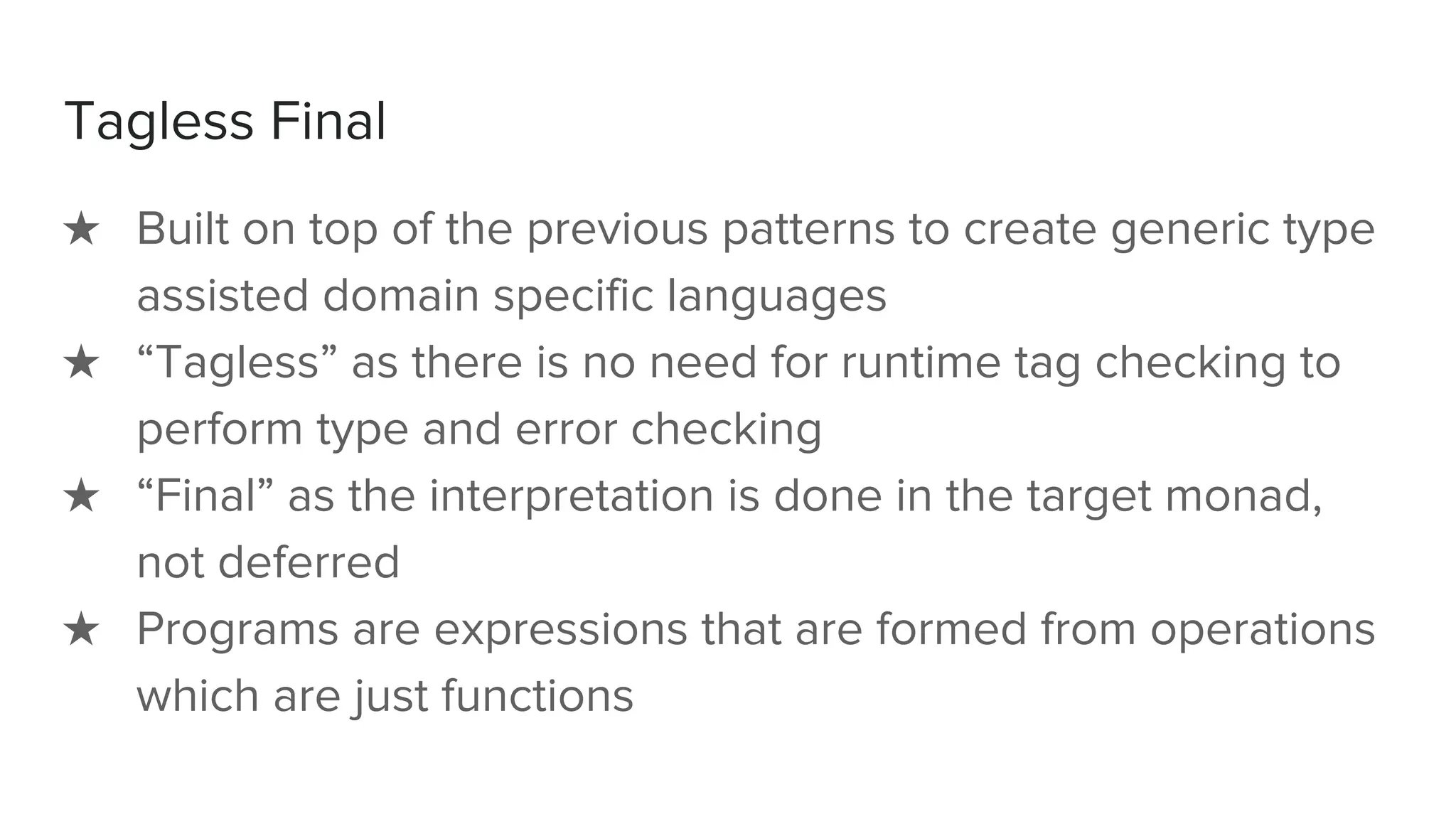
![Tagless final - algebra and business logic
trait ContactRepository[F[_]] {
def get(name: String): F[Option[Contact]]
def update(contact: Contact): F[Contact]
}
class AddressBook[F[_]: Monad](cr: ContactRepository[F]) {
def updateAddress(n: String, addr: Address): F[Either[Error, Contact]] = {
cr.get(n) flatMap {
case None => Monad[F].pure(Left(NotFound(s"$n not found")))
case Some(c) => cr.update(c.copy(address = addr)).map(Right(_))
}
}
}](https://image.slidesharecdn.com/genericfunctionalprogrammingwithtypeclasses-190326075104/75/Generic-Functional-Programming-with-Type-Classes-23-2048.jpg)
![Tagless final - interpreters
class FutureInterpreter(db: Database) extends ContactRepository[Future] {
override def getContact(name: String): Future[Option[Contact]] =
db.findContact(name)
override def updateContact(contact: Contact): Future[Contact] =
db.updateContact(contact)
}
class IOInterpreter(dobbly: Dobbly) extends ContactRepository[IO] {
override def getContact(name: String): IO[Option[Contact]] =
dobbly.query(d"find contact name = $name")
override def updateContact(contact: Contact): IO[Contact] =
dobbly.query(d"update contact = $contact")
}](https://image.slidesharecdn.com/genericfunctionalprogrammingwithtypeclasses-190326075104/75/Generic-Functional-Programming-with-Type-Classes-24-2048.jpg)
![Tagless final - usage
val result: Future[Either[Error, Contact]] =
new AddressBook(new FutureInterpreter(db))
.updateContactAddress("John Doe", address)
val io: IO[Either[Error, Contact]] =
new AddressBook(new IOInterpreter(dobbly))
.updateContactAddress("John Doe", address)
val result: Future[Either[Error, Contact]] = io.transactionally().run()](https://image.slidesharecdn.com/genericfunctionalprogrammingwithtypeclasses-190326075104/75/Generic-Functional-Programming-with-Type-Classes-25-2048.jpg)
